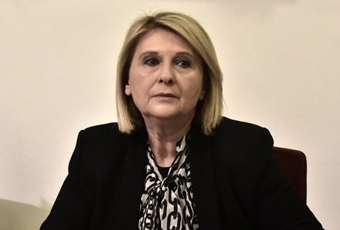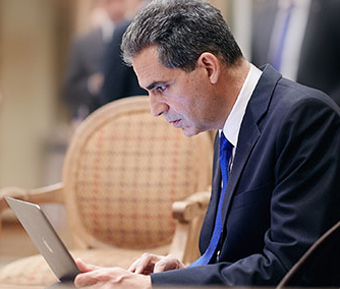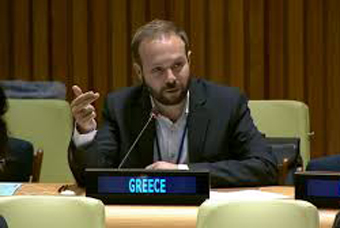Press Office
Athens, 19 November 2020
High-level Interparliamentary Conference on Migration and Asylum in Europe
A delegation from the Hellenic Parliament, consisting of Mrs. Sofia Voultepsi, Vice-Chair of the Permanent Committee on Public Administration, Public Order and Justice, Mr. Angelos Syrigos, a member of the European Affairs Committee and Mr. Yiorgos Psychogios, a member of the Permanent Committee on Public Administration, Public Order and Justice, participated, via teleconference, in the High-level Interparliamentary Conference on Migration and Asylum in Europe, co-organized by the European Parliament and the German Bundestag.
Mr. David Sassoli, the President of the European Parliament opened the Conference, along with the President of the European Commission, Mrs. Ursula von der Leyen, the President of the Bundestag, Mr. Wolfgang Schäuble and the Director General of the International Organization for Migration, Mr. Antonio Vitorino.
In particular, the EP President stressed, inter alia, that the human factor needs to be at the centre of any effective European policy on migration and asylum, since the borders of Italy, Spain, Greece and Malta are essentially European borders.
The President of the European Commission, Mrs. von der Leyen, underlined the significant contribution that migrants often make to the communities that are hosting them, mentioning the example of the German-Turkish duo behind the COVID-19 vaccine. Furthermore, she claimed that the New Pact on Migration and Asylum aims to find a balance between the need to welcome refugees, to combat human trafficking and to ensure integration and equal treatment, including of those who cannot remain in Europe.
Mr. Schäuble pointed out that there are no easy solutions, since rescuing people at sea is a humane and legal obligation of the Union. He underlined that traffickers exploit EU values to their benefit and also that the returns policy needs to be reinforced, so that they don't use false motives.
Thereupon, the speakers answered to a limited number of questions by MPs form national parliaments and MEPs, with Mrs. Voultepsi representing the Hellenic Parliament.
 Mrs. Voultepsi referred to the events of past February, when Turkey used desperate people at the country's Northern borders to serve its own geopolitical agenda. Since then, she added, Greece has had to maintain its armed forces, law enforcement and coast guard on high-alert, which is to the economic detriment of the country. She went on to underline that Turkey is acting as a trafficker of migrants and that it is wrong to consider Turkey a victim of the war in Syria and she concluded by requesting a clear response from the EU to Turkey.
Mrs. Voultepsi referred to the events of past February, when Turkey used desperate people at the country's Northern borders to serve its own geopolitical agenda. Since then, she added, Greece has had to maintain its armed forces, law enforcement and coast guard on high-alert, which is to the economic detriment of the country. She went on to underline that Turkey is acting as a trafficker of migrants and that it is wrong to consider Turkey a victim of the war in Syria and she concluded by requesting a clear response from the EU to Turkey.
Mr. Sassoli responded by saying that he visited Evros along with other high EU officials, at the time when Turkey was causing upheaval and clashes at its land borders with Greece and noted that the response to Turkey must include the strong unity of the EU member states and dialogue. He also stressed that Greece's and Cyprus' territorial waters are EU territorial waters.
Summing up, he referred to the pronounced migratory pressure put on our country in 2015, which basically led to the re-examination of migration policies and which restarted the dialogue at a European level.
The debate that was held thereupon was three-fold: a) on the relationship between solidarity and responsibility in migration and asylum management, b) on the external dimension shaping partnerships with third countries and c) on legal migration and integration – best practices and the way forward.
During the debate on the second theme, Mr. Syrigos took the floor, and mentioned that for more than 13 years, three countries, Greece, Italy and Spain, have seen the height of entries into the EU, carrying the biggest burden of the migration and refugee flows. He pointed out that cooperation with third countries is necessary, on the basis of the principle “more for more” for countries that cooperate and “less for less” for those countries unwilling to cooperate and underlined that concerted pressure needs to be put by all EU countries, through the implementation of a common European Returns Mechanism, which will multiply the capacity to put pressure, while at the same time offering aid to those countries facing the biggest problems.
On the third theme, Mr. Psychogios pointed out  the need to establish a comprehensive integration scheme for refugees and migrants in the member states. He referred to the proposals by the National Integration Strategy announced by the Greek government in 2018, which provided an action plan for access to public education for the children of refugees, access to public healthcare services, access to cultural events, and also access to the labour market for asylum seekers and refugees, on the basis of targeted programmes and skills. Furthermore, he claimed that these policies are to the benefit of everyone in Europe, since they strengthen European values as well as social and economic growth, while, at the same time, they fight against xenophobic arguments looking for scapegoats, creating hatred and hampering social integration in Europe.
the need to establish a comprehensive integration scheme for refugees and migrants in the member states. He referred to the proposals by the National Integration Strategy announced by the Greek government in 2018, which provided an action plan for access to public education for the children of refugees, access to public healthcare services, access to cultural events, and also access to the labour market for asylum seekers and refugees, on the basis of targeted programmes and skills. Furthermore, he claimed that these policies are to the benefit of everyone in Europe, since they strengthen European values as well as social and economic growth, while, at the same time, they fight against xenophobic arguments looking for scapegoats, creating hatred and hampering social integration in Europe.
Summing up, the President of the German Bundestag, Mr. Wolfgang Schäuble, spoke of the need to find a common European solution, bringing together all views, in order to help those in need, taking into account freedom, the rule of law, solidarity and mutual respect. The EP President, Mr. David Sassoli, pointed out that in the current circumstances we will need to be practical and pragmatic when proposing solutions, put aside our differences, show courage and flexibility, without losing sight of the fact that asylum policy is an essential part of migration. Mentioning the Moria camp in Lesbos and recent events there as an example, the EP President pointed out that the refugees hosted there make up abuut 0,0005% of the EU's population, which means, as he said, that if each European city with more than 35.000 inhabitants were to host one migrant, the problem would have been solved and responsibility sharing would have been a reality. In closing the conference, Mr. Sassoli noted that migration and integration are factors of growth for the societies and it is important to take the necessary supporting measures and to recognize their positive aspects.
Back